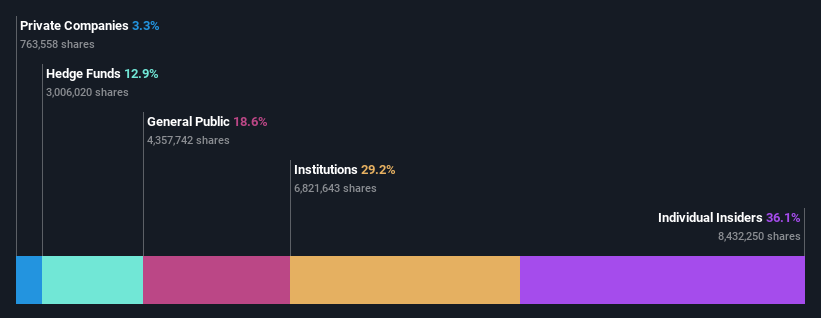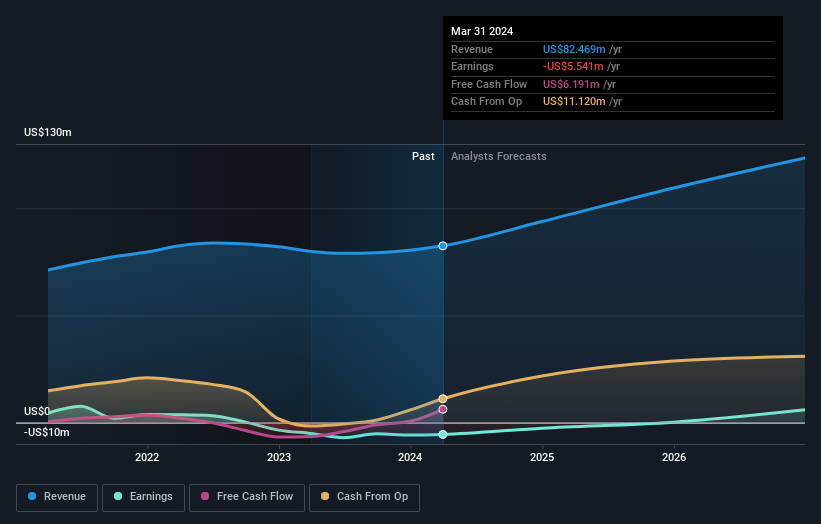Please use a PC Browser to access Register-Tadawul
Following recent decline, Gaia, Inc.'s (NASDAQ:GAIA) top shareholder Top Key Executive Jirka Rysavy sees holdings value drop by 11%
Gaia, Inc. Class A GAIA | 0.00 |
Key Insights
- Gaia's significant insider ownership suggests inherent interests in company's expansion
- A total of 6 investors have a majority stake in the company with 52% ownership
If you want to know who really controls Gaia, Inc. (NASDAQ:GAIA), then you'll have to look at the makeup of its share registry. We can see that individual insiders own the lion's share in the company with 36% ownership. That is, the group stands to benefit the most if the stock rises (or lose the most if there is a downturn).
As market cap fell to US$113m last week, insiders would have faced the highest losses than any other shareholder groups of the company.
Let's delve deeper into each type of owner of Gaia, beginning with the chart below.

What Does The Institutional Ownership Tell Us About Gaia?
Institutional investors commonly compare their own returns to the returns of a commonly followed index. So they generally do consider buying larger companies that are included in the relevant benchmark index.
Gaia already has institutions on the share registry. Indeed, they own a respectable stake in the company. This can indicate that the company has a certain degree of credibility in the investment community. However, it is best to be wary of relying on the supposed validation that comes with institutional investors. They too, get it wrong sometimes. It is not uncommon to see a big share price drop if two large institutional investors try to sell out of a stock at the same time. So it is worth checking the past earnings trajectory of Gaia, (below). Of course, keep in mind that there are other factors to consider, too.

It looks like hedge funds own 13% of Gaia shares. That catches my attention because hedge funds sometimes try to influence management, or bring about changes that will create near term value for shareholders. From our data, we infer that the largest shareholder is Jirka Rysavy (who also holds the title of Top Key Executive) with 26% of shares outstanding. Its usually considered a good sign when insiders own a significant number of shares in the company, and in this case, we're glad to see a company insider play the role of a key stakeholder. With 7.4% and 5.4% of the shares outstanding respectively, AWM Investment Company Inc and Koller Capital Llc are the second and third largest shareholders. Furthermore, CEO James Colquhoun is the owner of 4.4% of the company's shares.
On further inspection, we found that more than half the company's shares are owned by the top 6 shareholders, suggesting that the interests of the larger shareholders are balanced out to an extent by the smaller ones.
While it makes sense to study institutional ownership data for a company, it also makes sense to study analyst sentiments to know which way the wind is blowing. There is some analyst coverage of the stock, but it could still become more well known, with time.
Insider Ownership Of Gaia
While the precise definition of an insider can be subjective, almost everyone considers board members to be insiders. Company management run the business, but the CEO will answer to the board, even if he or she is a member of it.
I generally consider insider ownership to be a good thing. However, on some occasions it makes it more difficult for other shareholders to hold the board accountable for decisions.
Our most recent data indicates that insiders own a reasonable proportion of Gaia, Inc.. Insiders own US$41m worth of shares in the US$113m company. It is great to see insiders so invested in the business. It might be worth checking if those insiders have been buying recently.
General Public Ownership
With a 19% ownership, the general public, mostly comprising of individual investors, have some degree of sway over Gaia. This size of ownership, while considerable, may not be enough to change company policy if the decision is not in sync with other large shareholders.
Private Company Ownership
It seems that Private Companies own 3.3%, of the Gaia stock. It might be worth looking deeper into this. If related parties, such as insiders, have an interest in one of these private companies, that should be disclosed in the annual report. Private companies may also have a strategic interest in the company.
Next Steps:
I find it very interesting to look at who exactly owns a company. But to truly gain insight, we need to consider other information, too. Be aware that Gaia is showing 1 warning sign in our investment analysis , you should know about...
But ultimately it is the future, not the past, that will determine how well the owners of this business will do. Therefore we think it advisable to take a look at this free report showing whether analysts are predicting a brighter future.
NB: Figures in this article are calculated using data from the last twelve months, which refer to the 12-month period ending on the last date of the month the financial statement is dated. This may not be consistent with full year annual report figures.
This article by Simply Wall St is general in nature. We provide commentary based on historical data and analyst forecasts only using an unbiased methodology and our articles are not intended to be financial advice. It does not constitute a recommendation to buy or sell any stock, and does not take account of your objectives, or your financial situation. We aim to bring you long-term focused analysis driven by fundamental data. Note that our analysis may not factor in the latest price-sensitive company announcements or qualitative material. Simply Wall St has no position in any stocks mentioned.



